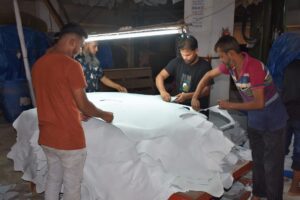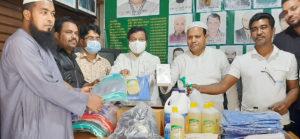Strengthening Knowledge, Awareness and Advocacy on Social and Environmental Conditions and Establishing Labour Standards for Workers in the Leather-Based Value Chain
The Bangladesh government has recently declared tannery as one of the highest priority sectors in the country and in 2017, leather was declared as the “Product of the Year”. The government has also set a target to achieve US$ 5 billion from the leather export by 2021. Leather is one of the 15 sectors identified for generating national income, accounting for more than 3 percent of the country’s exports after the readymade garment sector which is holding the second position in terms of foreign earnings. At present, leather and leather products are being exported to about 53 countries across the world. BLF implemented this project in the Tannery Industrial Estate (TIE), Savar, Dhaka supported by Mondiaal FNV. The goal of the project is to ensure that the government, buyers, and stakeholders concerned engage in ensuring compliance to promote and achieve a decent working environment, thus maintaining proper labour standards for tannery workers in Bangladesh. The project’s objectives are to contribute to engaging the government to develop a policy with adequate information for ensuring the social protection of the tannery workers; ensure that tannery workers in the TIE have a proper strategy for organising and union building and improved structure to organise the unorganised and outsourced workers, and ensure improved environmental and working conditions with better health and safety practices and solidarity among the tannery workers in Savar.
The major components of the program are:
- Occupational Safety and Health & Decent Work
- Organising & Capacity Development
- Leadership Development
- Gender-Based Violence
- Social Dialogue
Out of 155 tanneries in Savar, this project covered 56 factories (unionised 23 and non-unionised 33) and total project beneficiaries are 2,371 (Direct-1,121 and Indirect-1,250). Tannery workers, Tannery Workers’ Union (TWU), Labour Rights non-governmental organisations (NGOs) and civil society organisations (CSOs), associated trade union organisations, community organisations, Bangladesh Tanners Association (BTA), Bangladesh Finished Leather, Leather Goods & Footwear Exporters’ Association (BFLLFEA), local government institutions (LGIs) – Union Parishad and Upazila Parishad, government institutions, MoLE, DoL, MoI, DIFE, BSCIC, UNO, Upazila Social Services offices, Upazila Women Affairs offices are the main stakeholders.




